#how many references to jesus in the old testament
Explore tagged Tumblr posts
Text
One of the most interesting things about religion to me is that so many people don’t even see the mental gymnastics they are doing to try and shape the biblical texts into a framework that is acceptable in the modern day and it comes out looking like something that none of the authors would have approved of.
#not to mention that they were written by authors at different times and for different purposes#so they say lots of different things#which makes it easy to pick and choose the interpretation that best matches what you want#like the ‘one man one woman’ definition of marriage that doesn’t exist literally anywhere in the Bible#women were property and men could have as many as they wanted#but then once the Greeks influenced them a bit in the New Testament it says leaders of the church should have one wife#so that means the Bible is against polygamy even though every man in the Bible had multiple wives#or the people that say the Bible is against slavery#even though there is literal chattel slavery described in the Old Testament with commands on how to do it#and in the new testament slaves are told to obey their masters#then they say that they aren’t slaves just servants#which is completely false#it reminds me of how so many Protestants are vehemently against alcohol#so whenever the Bible refers to wine in a good context they say it’s juice#and whenever it’s bad it is wine#even though several different words are used that basically all refer to fermented alcoholic wine#they translate them all differently as needed#like how Jesus said sell all your belongings and give them to the poor#then the Bible tells how literally all of the early Christians sold all their possessions and donated the money#and now people say that just means to be generous#and then don’t even leave a tip at a restaurant because they hate handouts
11 notes
·
View notes
Text
In Judaism, one alternative way of referring to converts is "Jews by Choice."
If a parallel term exists in Xtianity I am not aware of it, but I would like to propose that it really should exist, albeit not just in reference to converts but to all Xtians. Every Xtian should get the opportunity to fully understand their faith in context and to make an informed decision to choose it for themselves. As it stands, many Xtians are deeply ignorant about Jewish history (before and after the formation of Xtianity), the original cultural context for the stories in the Old Testament, the cultural Jewish context that Jesus existed and taught in, the critical historical (scholarly) read of these texts, what they probably meant to the Israelites who produced them, and what they mean to Jews today and how we read these same texts differently in our religious context.
This creates a problem, where Xtians are taught only the narrow band of context that their church deems it important for them to know, and even that is frequently inaccurate or so limited in scope as to make it inaccurate by omission.
And this is because the reality is that the Tanakh (that is, the Hebrew and Aramaic scriptures that the Old Testament is based on) does not naturally or inevitably lead to the Jesus narrative. If you are starting from a Xtian perspective, and especially if you read the New Testament first and then and only then dive into the Old Testament, the Jesus narrative is obvious to you because you are looking for it, expect to see it there, and are coming at these texts with that reading lens in mind. And it's not that you or anyone else is nuts to see that narrative there - there are plenty of solid Xtian reads of these texts that make sense if you already believe in Jesus as presented by the New Testament.
But what the vast majority of Xtians aren't taught is how to approach the Tanakh from a Jesus-neutral perspective, which would yield very different results.
Now you might fairly ask, why would they *need* to approach the Tanakh with a Jesus-neutral perspective? They're Xtians! Xtians believe in Jesus, that's what makes them Xtians!
My answer is multi-pronged: First, I believe that G-d wants a relationship with all people, and speaks to us in the voice we are most likely to hear. That's inherently going to look different for everyone. And that's okay! G-d is infinite, and each of our relationships with G-d are going to only capture the tiniest glimpse into that infinite Divine. Therefore, second, when approaching religion, everyone sees what they want to see. If you nothing religion but find your spirituality in nature, you're going to come at these biblical texts with that lens and take away from them similar things that one might take away from other cultural mythologies. If you, like me, are coming at these texts with a Jewish mindset, you are going to come away with a portrait of Hashem and our covenantal relationship as Am Yisrael. And, of course, if you read with a Xtian lens, you're going to see the precursor narratives leading up to Jesus. That reading bias is not only understandable but good or at least deeply human. Everyone sees what they want to see in these texts. There is no objective or flawless way to read them, and to claim that there is, is to claim that not only is there only one answer, but only one kind of relationship that G-d wants to have with people, that you personally happen to know what that is, and that everyone else is wrong. I am sorry, but if you believe that - if you truly think that you in particular (and/or the people you happen to agree with) know the mind of G-d, then you do not worship G-d. You worship yourselves, because to know the entirety of G-d would require you to be G-d. There's a term for that. That doesn't mean there aren't wrong answers too. But it does mean that there is no singular unimpeachable reading of the texts. What you see in these texts then, says far more about you than it does about the texts themselves or G-d.
So the question then becomes: Why do you want to see this? (Whatever your "this" is.) If your read of these texts is something you choose, why do you choose to see what you see? And is it a meaningful choice if you are not taught other ways of knowing, other perspectives on these texts, and to think critically while exploring them?
Judaism inherently teaches a multiplicity of opinions on the texts, and maintains that they can be read to mean different things, even at the same time by the same person. Deep textual knowledge and methods for learning more, asking questions, challenging accepted answers as a way to discover new meaning, and respectful disagreement are baked into our culture and methods. Some Xtians of some denominations have analogous processes, although on the whole still emphasize correct unified belief over correct action with a multiplicity of belief. I am not suggesting here that Xtians stop approaching their own scriptures as Xtians or adopt Jewish methods instead. What I am suggesting is that Xtians should be taught a fuller picture of these texts and learn other perspectives so that they (1) understand their own beliefs and why they believe them (or after further inquiry if they believe them), and (2) understand and respect that this is what they are choosing to believe and that it is not the only thing one could reasonably believe. Because (3) if not, they are more susceptible to having their faith shattered at random by something unexpected, and will connect less to their faith as a relationship with G-d and more as an obligation based on an unchallenged world view.
And, frankly? (4) It will help them to be better neighbors, to love their neighbor as themselves, and to give to others the respect that they would like to receive.
Being taught the historical context, Jewish history before and after Jesus, the differences between the Old Testament and the Tanakh, the timeline of the development of Xtianity in relationship to rabbinic Judaism in the wake of the destruction of the Second Temple, the development of church doctrine and the various splits amongst the denominations, and Jewish readings of the Tanakh would give clarity and desperately needed context to Xtians about their religion. Is there some risk that some people, upon understanding these things would drop out of faith entirely or, like me, discover that they are actually meant to be Jews? Yes, definitely.
But let me let you in on a little secret: you don't want those people to begin with. You really don't. Because the reality is that if a person is not called to relate to G-d through Jesus, eventually that person will learn this about themselves one way or another. If they are given the information and tools to make a meaningful choice, they will part company on good terms. If not, they will likely become disillusioned and leave the church in pain, anger, and even trauma. They will bring that out into the world with them, and spread the bad news about the Good News making it even more likely that other people who were already on the fence will jump ship on bad terms. You cannot trick people into a meaningful relationship with G-d. You can only give them the tools they need in order to explore on their own and the rest is between them and G-d.
And the bottom line is that you don't need to and should not be afraid of knowledge. If your faith cannot stand up to scrutiny, then it deserves that scrutiny tenfold. The people you lose from the flock? You would have lost them anyway, because we aren't in the driver's seat here. G-d is. Hashem called me to be a Jew with just as much love and desire to connect as G-d calls Xtians to the church and to Jesus. A faith examined is a faith deepened or exposed in its weakness. And if it is the latter, don't you want people to know this sooner rather than later in order to fix it?
So my proposition and wish for Xtians is that they become Xtians by Choice. That they delve deeply into the origins and context of their faith so that they can be 100% certain that they understand their Xtian faith and why they choose to relate to G-d through that lens.
#every hour is theology hour around here apparently#interfaith#this is tochecha from an ex-Xtian ger#who desperately wants for my Xtian family friends and neighbors the level of peace and security in their faith that I now enjoy#the church is not doing its congregation any favors by under-educating them on these matters#Xtians deserve better and should demand better from the church#xtianity#anyway if I have any Xtian followers here who would like book suggestions lemme know
577 notes
·
View notes
Text
The Exorcists’ Masks of Virtue
The vast majority of Exorcists in Hazbin Hotel have a notable design element that other angels don’t: their masks are missing an eye. Specifically, the right eye.


I believe this is a reference to the Bible, Matthew 5:29. Jesus says, “If your right eye causes you to stumble, gouge it out and throw it away. It is better for you to lose one part of your body than for your whole body to be thrown into hell.”
He’s being hyperbolic. Mr Free Healthcare was not pro-mutilation. What he means is that you have to be willing to make sacrifices to prevent sin. The context of the eye metaphor is him condemning adultery and warning that even something as easy, casual and small as a look full of lustful intent can lead to further, worse sin if you don’t notice your sin, hold yourself accountable for it and do the work to not let it influence your decisions. This will probably be hard. It could be very, very painful. Changing your perspective can feel as horrible as plucking out your eye, so many people can’t bring themselves to do it. But although it won’t feel that way in the moment, it’s healthier for our general wellbeing in the long run to abandon traits and behaviours that damage ourselves and/or others.
(You may notice that Jesus’s teaching that you can have sinned, redeem yourself by giving up sin and thus escape damnation is the founding principle of the Hazbin Hotel. You may also notice that it contradicts everything the Exorcists believe.)
The Exorcists seem to follow this idea of painfully excising badness for the sake of the greater good devoutly to the point of placing it above teachings like ‘Thou shalt not kill’, with their job being to remove sin, in the form of sinners, to protect Heaven. Hence the missing right eyes. They’re a declaration of moral righteousness and inability to stumble.
But the truth is that the Exorcists all have their right eyes. Their flawlessness is a facade. Underneath, they are untouched, think themselves morally untouchable and, as shown by their horror and outrage when even one of them is killed, would much rather be physically untouchable too. This perfectly represents their complete unwillingness to acknowledge their own faults, let alone improve. They are never the ones who sacrifice. They force the sinners to sacrifice and don’t compensate it with any salvation. They metaphorically rip out the sinners’ eyes, but still condemn their entire bodies as inherently, permanently sinful. So they’ll just have to do another Extermination to get the other eyes! And another one to cut off their right hands! And so on until there’s nothing left.


The only exception to the rule is Vaggie, both in appearance and character. Her mask has the left eye crossed out instead. Even before her expulsion, she’s set apart to the audience as an Exorcist who has the capacity to, shall we say, see a different side of things. Her mask having its ‘sinful’ right eye reflects her understanding that the Exorcist worldview is wrong.

When she almost kills a demon child, her hateful vision clears. She discards the part of herself that’s an unquestioning, merciless agent of death, terror and grief… and as punishment for what Lute perceives as treacherous weakness, gets her eye plucked out.

Of course Lute leaves her with only the ‘sinful’ eye. It brands Vaggie forever as the inversion, a perversion, of what the Exorcists are meant to be.

You know, all this talk of eye removal in the Bible reminds me of another line - ‘an eye for an eye’. Adam directly quotes it in “Hell is Forever”. He uses it to frame the Exterminations as Old Testament-style punitive justice; the sinners did harm and so they receive it. But putting aside the debate about how ethical the concept of revenge is, the entire point of taking an eye for an eye is that it’s proportional. The punishment fits the crime. If someone cuts your eye out, you shouldn’t murder their whole family in front of them and then slowly disembowel them to death. That would be the sin of wrath. You should just make them pay without excessive pain or collateral damage. This is the fairest form of revenge.
The Exorcists don’t do that! The Exterminations aren’t proportional to the wrongs of all they hurt, nor was Vaggie’s brutal punishment equivalent to her extremely mild insubordination. Lute literally takes Vaggie’s eye, and more, after Vaggie does nothing to her! That’s the opposite of the phrase! Adam and his soldiers are wrathful and cruel, deriving satisfaction from others’ suffering. But they just can’t stop going on and on about how disgustingly evil the sinners are, in total hypocrisy… despite some of the sinners being far better people than the genocidal Exorcists are… it’s like they’re obsessed with specks of dust in the sinners’ eyes when they have massive logs stuck in their own. Oh hey, that’s in the Bible too!
#both emotionally and symbolically i am rooting for vaggie or charlie to take out one of lute’s eyes#i was like ‘cool vaggie’s missing the opposite eye to her former mask!’#and then i went back and saw that her mask was also different#and then i went down a rabbit hole of biblical mentions of bad things happening to eyes#i know god and jesus (and the holy spirit) probably won’t appear in the show#at least not in person#but i do cherish the mental image of adam and his genocidal army hanging out#when jesus christ bursts in with a whip#and gets all ‘you have made my father’s house into a den of thieves’ on them but an order of magnitude more intense#because HE SAID LOVE ONE ANOTHER#WHERE IS THE LOVE#HE SPECIFICALLY REQUESTED IT#i’m not christian! i’m a hardcore atheist!#religion is just as fictious to me as egyptian mythology#however i am also autistic and have major special interests in mythology and folklore#so here i am fervently writing analysis of the sermon on the mount#hazbin hotel#hazbin vaggie#hazbin hotel vaggie#vaggie#hazbin hotel exorcists#hazbin exorcists#hazbin hotel analysis#hazbin analysis
311 notes
·
View notes
Text
Why doesn't the Bible just say, "Jesus is God?"
I've made a series of posts already elaborating the backing for Trinitarian beliefs, and so you may be thinking about how it's actually come up several times that the Bible actually does say Jesus is God on a couple of occasions namely in the confession of Thomas and also of course Jesus's famous statement, "Before Abraham was, I Am."
The question remains though, why does the majority of the Bible typically refer to Jesus by other titles other than "God"?
The answer is, actually, what I consider one of the strongest, if not THE strongest argument for the deity of Christ, so hold on to your hats.
The fact that the Bible doesn't outright say "Jesus is God" except in indirect cases is more reflective of the relative importance and etymology of the word "theos" (translated as "God") than it is of Jesus's identity.
That is because this word is relatively generic.
The writers of the New Testament would have considered the word "Lord" ("Kyrios" in the Greek) as a much more definitive way of tying Jesus's identity to Yahweh, the God of the old Testament.
This is because, in the Septuagint, which is the Greek translation of the Old Testament as quoted by the writers of the New, the word "Yahweh" was rendered, infallibly, in Scripture, as "Kyrios".
(Note: Kyrios translating to English as "Lord" gives rise to the indicator "LORD" in modern English bibles for the name of God.)
Therefore, every time that the New Testament writers use the word "Kyrios" to say "Christ is Lord", they are not merely calling him, "a lord" as someone in the middle ages might perceive it, but calling him God in a much more direct and personally identifying manner than using the term "theos".
Once you have this in mind, the Bible actually says Jesus is God on almost every page of the epistles, because you can hardly turn anywhere without seeing that Jesus is LORD, and it is not shocking why the NT writers found this term more urgent and compelling than Theos, which is already often used many times alongside the divine title anyway, as "The LORD God".
There should be absolutely no need for any confusion here.
338 notes
·
View notes
Note
Hii genuine question. Are Christian holidays not actually from a basis of paganism? I felt like from what I’ve read about it before made sense to me
So like, a lot of people basically jumped to conclusions whenever a Christian holiday was either celebrated near the time of an old pre-Christian holiday, or its name sounded superficially similar to something pre-Christian, or its popular celebrations included elements that didn't seem quite Christian enough.
So, let's take Easter, for example. At one point, this guy Bede mentioned that the holiday got its name from "Eostremonath," IE, Eostre Month, which was named after an old goddess, Eostre. Now, that may very well be true, but it doesn't demonstrate that the holiday had pagan origins. See, when it comes to words for the holiday celebrating Jesus's resurrections, English is an outlier. Most European languages use words that derive from Pascha, which is ultimately derived from the Hebrew word Pesach, as in Passover.
There's also no evidence that Eostre's symbols included eggs or hares. In fact, everything we know about Eostre comes from Bede. Anything else is just guesswork. Dr. Andrew Henry of ReligionForBreakfast on YouTube, by the way, has a decent video on the topic of Eostre.
So why eggs, anyway? Well, back in the day, eggs were forbidden during Lent, so by the time Easter rolled around people had like a month's worth of eggs stacked up. So like, why not eggs?
And then of course, Alexander Hislop completely pulled the Easter/Ishtar connection out of his ass, because he was an anti-Catholic conspiracy theorist who did not care about scholarship, only about demonizing the Catholic Church.
Christmas has been claimed to have been derived from Saturnalia or Sol Invictus based on similarities in dates, but scholars have found that there was this belief that holy men died on the same day they were conceived. So if we start with Good Friday and fast forward nine months, that puts us either in December or January, depending on when exactly you believe Jesus was crucified. So Western traditions, which went for March 25, settled on December 25, whereas Eastern traditions, which went with April 6, got January 6. Dr. Andrew Henry talks about this here.
Christmas trees are also claimed to be pagan, but in reality they weren't a thing until the late medieval period. The earliest known reference to a decorated tree goes back to 1419. Or, it might be a tree; the word used ("Bom") could also mean a pole, as in a decorated pole like a maypole. It was shortly after this that people began erecting trees out in public squares. Again, Dr. Andrew Henry has a video on this.
And yes, it's true that Christmas is called something like Yule or Jol in other languages, but as we've determined from Easter, a name doesn't necessarily tell us where something came from. Most languages don't use anything like Yule; for example, English uses Christmas, as in, "Christ's Mass," while many languages use a word deriving from the Latin natalis, as in "birth," as in "Jesus's birthday."
Just about every attempt to link a Christian holiday to a pre-Christian one is operating on similarly poor methodologies. People just kinda drew conclusions based on things looking kinda similar without looking closer to see if they were really actually connected, or based on things not lining up with their personal ideas of how Christians ought to behave. (This whole idea that pure, true Christianity is sourced 100% from the Bible and the Bible alone is very Protestant, btw. It's also a position that would have baffled the earliest Christians, who didn't even have a New Testament and didn't regard things like the the epistles as holy scripture yet.)
Now of course, the Christianization of Europe didn't overwrite its cultures entirely, and local cultural beliefs and traditions ultimately did influence holiday traditions in some way; Christmas elves are a pretty clear example of this. But this whole idea that the Catholic Church just stole all these pagan holidays and remade them into Christian ones is pseudohistory.
50 notes
·
View notes
Note
I'm on my nth re-read of books 1-4, and I keep finding new things to be delighted by, on top of the old reliable lines that make me giggle every time. Like in book 4:
“Yeah,” said Harry, whose success had overdosed him with optimism. “Hey, think about this: you reckon I can just Banish the water and walk down?”
“Oh, bless, he thinks he’s Moses.”
How does (presumably pagan-ish or non-religious based on holiday celebrations) Draco know about Moses? Does he think Moses is a wizard??? I mean... he DID accomplish several miracles with a big stick. Any of the implications here make me cackle
Oh this is awesome, I've been wanting to talk about this for ages: I think wizards know what the Bible is! And Christianity, and Judaism and Islam, and I think there are practicing members of all of those religions (and more!) in the Wizarding World. Here's why.
The Bible (Old Testament specifically — Draco's references lean towards the OT because that's the broader cultural referent, it's the common glue of the Bible/Quran/Torah and if wizards know any Abrahamic text, it's that) is a huge, ubiquitous, world-shaping cultural text that was thousands of years old before the International Statute of Secrecy. The date of 1692 for the SOS means that any muggle culture before the 17th century is fair game, even if it's not accepted by wizards. So that's why I think atheist/agnostic/pagan wizards should still have at least referential familiarity with it.
The fact that wizards celebrate Christmas (NOT Yule, although obviously in Lionheart they do both) tells me that there is at least vestigial religious belief in the population. Expressions like "Merlin" in place of "God" tells me that wizards probably have a different relationship with it — Merlin's generally treated as a kind of prophet? — which is giving "splinter sect of Christianity defined by the emergence of Merlin as a separate prophet for wizards," but I'm not gonna spiral too far into that headcanon, because this is a lore analysis post. But that's my working idea, here.
The first-order response to the "what about magic?" problem is: Not everything that happens in the Bible can be explained by the Harry Potter magic system. Water into wine, sure. Resurrection? Impossible, as far as 99% of wizards know. Harry Potter is the only person we know of to be fully resurrected, and even he's never technically full-dead. Moses parting the Red Sea? I mean, we can imagine spells that would do it, but think about how much water is in the fucking sea! We don't see anything of nearly that scope happen in the series. And what about manna? We know for a fact that you can't use magic to make food!
But let's sidebar that, and drill down on what you can explain. Water into wine. Curing the sick. Okay, cool. There's still a big difference between "established in-universe ability that has been ritualized and turned into technology" and "literal miracles." Walk on water? Sure, you could probably perform a spell for that. But does Jesus? Do we know, for a fact, that he had a wand, or that he cast a spell? Had the spell for that been invented yet? Are you even sure he was a wizard? Can we prove it? Moreover, would it matter?
This leads me to my bigger point about the nature of religious belief: if you believe the dude's divine, having magic doesn't change anything, right? Because he's still the son of God. Christians don't believe Jesus was divine because he performed the miracles; they believe he was divine and so performed the miracles. There are many different IRL-theological stances on how much of the supernatural stuff in the Bible "actually happened," and you can be a skeptic about the scientific facets while still subscribing to its broader philosophical and religious claims about God.
Even if you take Jesus and other Abrahamic characters out of the question, there's still a place for religion in wizarding society, because of the afterlife. With the exception of ghosts (who by their account have never been fully "dead," and so don't know it) and inferi, the relation between the wizarding world and the afterlife is a one-way conduit. That means there's still plenty of room for wizards to adopt religious beliefs specifically about the afterlife, and religion would still play a social role in defining how people approached those topics.
Finally, the pagan elements of the Harry Potter series read less to me as an espousal of sincere religious conviction and more as a ritualistic vestige of prehistorical magical practices. Since the universe's magic draws heavily on pagan ceremonies — especially in the realm of potions/herbology/magical creatures — ironically, I can't imagine paganism as a religion in the universe of Harry Potter. Like, it's just straight-up true! It would be like starting a religion around meteorology, or chemistry. There's no element of mystery or divinity involved for faith and belief to fill in the gaps; you know how magic works, and you can be good at it.
What JKR did with the magic system — apparently on accident — was to textually validate huge volumes of pagan practice without invoking any of the associated spiritual or religious beliefs. And since we live for seven years in the mind of a competent, practicing wizard who does tons of magic without seeming to believe in any particular god at all, I have to infer that you don't need to. Rowling has, again, likely not on purpose, built a universe whose central conceit is: "what if the pagans were just straight-up right?" and revealed the answer to be: "well, then it wouldn't be paganism anymore."
30 notes
·
View notes
Note
Real curious about trigun but I got three questions:
1) what's up with the Christian vibes?
2)the blond guys (plants???) have trans vibes, actual coding or just an accident? (fine either way just curious)
3) what's the plot? Space cowboys?
Anyways Millie is cool, (I once mistook the girl typically next to her for that guy from genshin impact)
1) Christian vibes are why I want to lock myself in a room for a month and emerge with a 3 hour video essay about Trigun very very badly right now.
Trigun spends a lot of time exploring Forgiveness, Mercy, and Redemption, which are famously also the themes of Jesus' wacky adventures in the New Testament.
But. You know how in the old testament there was like a bunch of Divine Wrath and stuff? And it feels really incongruent with the forgiveness in the New Testament sometimes. And also for many centuries Christians have cited God's divine acts of wrath as justification for incredible acts of cruelty against their fellow man? You know how that history of cruelty and punishment is, at this point, just as synonymous with Christianity as the Jesus Forgiveness stuff?
Well Trigun is about how the Jesus Forgiveness stuff is better. Not because Jesus said so but because of the enormous OBSERVABLE positive impact that forgiveness and redemption can have. Positive impact that wrath and retribution rob all parties involved of the chance to witness.
Trigun tells a story which demonstrates this in largely secular situations but underscores both the forgiveness and the wrath with divine imagery. And since both the forgiveness and the wrath are equally visually tied to the divine, symbols of divinity cannot be considered synonymous with perfection, unerring judgement, nor inherent rightness or goodness. Divinity becomes simply a symbol of power, and power is a double-edged sword as well. The power to do good is also the power to cause massive harm, and in many cases people will treat power pessimistically out of an understandable will for self-preservation.
But power is neither inherently good nor bad-- power ultimately reflects the flawed and fallible person weilding it. I could go on but this is really long so I'll stop lol :)
WAIT. Divinity = Power, Angels are the symbol of Divinity, Angels are messengers of God, Communication and connecting with others is emphasized, Communication = Power = Divinity ok I'll stop for real tee hee
2) I don't know if the trans coding was intentional, but HOLY SHIT is it THERE.
Most blatantly, Vash and Knives are Plants, and every other Plant we see is referred to as a woman/has female secondary sex characteristics.
Also Plants visually resemble angels, and it's common belief angels do not have gender like humans do since they are pure and holy beings. I couldn't quickly find a source for that, but I know that Alchemy has some emphasis on hermaphroditism as, like, the holier form. So I guess by that logic you could also say they're intersex but I'm veering off topic.
Thirdly in the 1998 anime they gave the child versions of Vash and Knives long hair that ended up being cut off in ways that symbolized important developments in their identities. Knives example is what I have on hand lol. It just smacks of transgenderism.


3) DEEP SPACE PLANET FUTURE GUN ACTION!!!!
Wacky space cowboy Vash the Stampede roams the space desert planet where humans are barely hanging onto survival using the tech of their spacefaring ancestors! He can shoot with perfect accuracy, and is wanted for DESTROYING AN ENTIRE CITY, but is a staunch pacifist?! How odd!
What's Vash's deal? What happened that made humans unable to go back to space? Why'd they land on this desert planet that sucks to live on? Learn this and much more in TRIGUN!
128 notes
·
View notes
Text
Is the Bible REALLY the Word of GOD?
There are so many ways to address this question, but today I want to unpack the idea that the bible was written by men out of their own heads, and cobbled together by some committee, leaving hundreds of other books out for no good reason other than popularity.

The Bible (the Protestant one) is a collection of 66 books, 39 in the Old Testament, and 27 in the New Testament. There are 40 human authors that wrote the various letters, prophesies, and histories contained in it, over a span of about 4000 years.
These men came from all walks of life. Some where shepherds, some were doctors, some were kings. Musicians and vagabonds. Scribes and Pharisees. Tax collectors and fishermen. Even within its pages, people remark on the responses of some of them, as they've never been to school, how could they know the scriptures so well?
[Act 4:13 KJV] 13 Now when they saw the boldness of Peter and John, and perceived that they were unlearned and ignorant men, they marvelled; and they took knowledge of them, that they had been with Jesus.
I've studied this book of books for around 40 years now. Read it through a few dozen times, and done countless in-depth studies into its wealth of content. One of the things I've noticed is that almost every verse in the bible has a reference to another verse. Often because the other verse is a prophesy in THIS verse that was fulfilled hundreds or even thousands of years later.
There's plenty of historical evidence, including the Dead Sea Scrolls, that the Old Testament books were written over a thousand years before the New Testament, yet there are thousands of references to Jesus, his life and ministry, his trial and crucifixion, and his resurrection and ascension. His coming again. His millennial reign. His final judgement and the beauty and majesty and eternity of heaven.
Those cross-references are indicated in the picture I included above. Tens of thousands of them, drawn out from point to point.
Fishermen and vagabonds, musicians and shepherds would have had a hard time writing anything, and predicting the future events a thousand years away? Um, no. It smacks of an omniscience not only across simultaneous events, but a knowledge of future events as if you were there. A knowledge only God could have. For example, in Psalm 22 David writes:
I am poured out like water, and all my bones are out of joint: my heart is like wax; it is melted in the midst of my bowels. My strength is dried up like a potsherd; and my tongue cleaveth to my jaws; and thou hast brought me into the dust of death. For dogs have compassed me: the assembly of the wicked have inclosed me: they pierced my hands and my feet. I may tell all my bones: they look [and] stare upon me. They part my garments among them, and cast lots upon my vesture. (Psa 22:14-18 KJV)
Indicating a knowledge of crucifixion that wouldn't be invented for a thousand years. Of the gambling for Jesus' clothes, a common practice for the soldiers of that time.
I don't have room here to unpack more, but this should make it clear. Men didn't write this. Oh, they held the pens. But God gave the words.
As to the inclusion of those 66 books and the exclusion of others? Well, that happened over time, from the Council of Rome in AD 382 and Council of Trent in 1563 AD. And finally, the Protestant canon was decided by the Thirty-Nine Articles in 1563, and almost 100 years later by the Westminster Confession of Faith in 1647.
These councils didn't make these decisions based on popularity. All of these letters, histories, and prophesies were examined thoroughly and had to pass various tests, including reference by other works in the collection, references TO other works in the collection, indication of prophecy fulfilled, and agreement with the rest of scripture as a whole. Other works, like additional books found in the Catholic Bible, like Tobit and I and II Maccabees, were found to be divinely inspired, but not in agreement with the whole of scripture. For example, Tobit was disputed as part of scripture by the first-century Jews. And found in the Protestant council to have theological differences.
Those books were deemed Apocryphal. Other books were declared Pseudo-Apocryphal, that is, out and out forgeries with spurious claims to having been written by one of the biblical characters, like the Gospel of Nicodemus. Containing inaccuracies and spiritual pitfalls and heresies.
What is in the Bible that we have today is the Word of God. it contains over 600 prophesies fulfilled in Christ. And several thousand more fulfilled throughout history. The bible says it best:
All scripture [is] given by inspiration of God, and [is] profitable for doctrine, for reproof, for correction, for instruction in righteousness: That the man of God may be perfect, throughly furnished unto all good works. (2Ti 3:16-17 KJV)
3 notes
·
View notes
Text
Catholicism in Omegaverse hc
I have a real unhealthy obsession with making Super Catholic Characters and forcing them to Confront Their Catholic Guilt And Trauma all day every day and my omegaverse stories are no exception to this soo... I have some ideas on how to warp Catholicism to my omegaverses :))
Pls be conscious of any TWs i placed some of them in particular may be very upsetting pls skip them if needed! Also a long post so pls keep reading under the cut fr

📿 Most basic tenants, core beliefs, rites (things like confession and confirmation), and services (mass, funerals, and wedding ceremonies) don't really need much changing and can stay true to the real world
📿 Typically God Himself and the Holy Family are depicted as totally dynamicless or a combination of all dynamics (Revelation 22:13, Revelation 1:8 worth the google lmfao)
📿 Historical Jesus (jesus the person not the religious figure) was probably a Beta but it's hard to tell since Rome sacked Israel destroying most early Christian documentation and followers.
📿 However sometimes when referring to the Holy Trinity dynamics do come up just like the Trinity is coded with gender irl. The Father (masculine) as The Alpha, the Son (masculine) as The Beta, and Holy Spirit (feminine) as The Omega
📿 All Saints have defined dynamics as many of them were real people. You'd typically pray to a saint that follows your own dynamic (an omega probably wouldn't pray to an alpha saint for help with an omegean issue for example)
📿 Orders that follow certain saints (think Franciscan monks for example) must be the dynamic of the saint or they cannot live with the rest of the devotees.
📿 Though the Church discourages speculation on the Holy Family's dynamics and refuses to take a position, Omegas have kinda claimed Mary for their own. Most Catholics who find an extreme importance in worshipping Mary are omegas
📿 Priests are mostly betas
📿 Betas have the easiest time getting into a seminary and convincing church officials of their vocation (a vocation is like your holy life purpose and in traditional Catholicism its either to fuck and make babies or to be a priest)
📿 Alphas are allowed in the priesthood but it is much more difficult for them to be accepted into a seminary. The church traditionally sees the vocation of alphas and omegas as the filling God's kingdom kind. Ruts also complicate things
📿 Chastity vows are still mandatory for clergy (ur mated to GOD now)
📿 It is assumed that betas have an easier time renouncing mating compared to an alpha (this is NOT true but the church is the church)
📿 Omegas are banned from seminaries and cannot enter priesthood. They are considered unclean and sinful by nature
📿 Eve is an omega hence the original sin being pinned on omegas (just like its pinned on women irl)
📿 Painful heats are considered part of God's punishment for disobeying His orders and partaking of the fruit
📿 Betas are not part of the creation story oddly enough (Adam the first alpha and Eve the first omega) and they're a little absent from the Old Testament, but they have a huge presence in the New Testament.
📿 Omegas do have a place in the clergy if they can convince the Church of their vocation. Omegas exclusively become nuns.
📿 Nuns are actually very valued simply because certain fields require that omegean touch. Teaching (Catholic schools are still very much a thing), childcare (orphanages and stay houses), and other social work (homeless shelters, food drives, anything that involves helping people in need) rely heavily on nuns
📿 The Church tends to wrongly make alphas masculine coded only and omegas feminine coded only
📿 its a major reason why many no long actively practice the religion
📿 Just like irl the Church struggles to keep up with modern times and this can be seen in the pairings they endorse
📿 The Church only supports a/o, b/b, a/female b, and male b/o pairings as these are the parings that can breed
📿 When a couple wants to take the next step and create a mate bond the Church asks that they HOLD OFF
📿 the Church strongly frowns upon sex before marriage and therefore mating before marriage
📿 Couples must complete pre cana first! and must marry like a good Catholic couple, in a Church under God officiated by a priest.
📿 Then the church asks they mate and make as many babies as possible lets go
📿 speaking of the Church irl still frowns upon contraception, so so does the omegaverse Church
📿 The Church also considers suppressants a form of contraception (and as a way omegas get around suffering for the original sin if the person is like crazy religious) so they aren't allowed
📿 Only in a medically needed situation are suppressants allowed
TW// Slightly NSFW for the next 4 bullet points
📿 Masturbation is also a no no both in irl and omegaverse Church
📿 So... relieving yourself during a rut/heat is frowned upon as this is a form of masturbation and God created the rut/heat cycle for babies not for selfish pleasure !! You have your heat and you deal with it !! You lie in your sinful slick and you pray !!
📿 Devout dynamics and clergy sworn to celibacy struggle with this (tho there is a black market for priest suppressants)
📿 Nuns and devout omegas have some of the worst heats, possibly even worse than a first heat just because they ignore their bodily needs and basic instincts in the name of religion
📿 This is viewed very... holy? Not sure of the right word here but it's held in high esteem and part of why nuns are such a big deal. Normal omegas tho aren't held so highly just bc they are free to mate
📿 Alpha admission into seminaries is rare because of this as well, Church authorities are wary of them being able to handle a rut like this
TW// SA, pedophelia, molestation for the next 4 bullet points
📿 There's a false statistic claiming that almost all sexual assault perpetrated by a priest are the crimes of alpha priests
📿 as said this is false, since the vast majority of the priesthood consists of betas most of the predators are betas as well
📿 SA, molestation, and grooming are still massive issues in the Church
📿 Male omegas are the biggest target of these crimes, though anyone can be affected. Male omegas are considered more vulnerable and easier to manipulate since the Church is very confused on the crossroads between gender and dynamic and refuse to update teachings (by this i mean since they create images of masculine alphas and feminine omegas female alphas and male omegas get lost. To someone from a devout pack/family with one of these dynamics it can be incredibly confusing and distressing to listen to church teachings making them more venerable to manipulation by gross old priests)
TW// NSFW for the next 2 bullet points
📿 The Church still frowns upon anal sex fr. Sometimes this confuses people to think sex with male omegas is sinful but anyone who paid attention in health class knows penetrative sex with a male omega isn't actually anal at all.
📿 The Church rarely clarifies this making it even harder for devout male omegas
📿 priests, monks, nuns, and clergy in general are expected to be as scentless as possible. It’s like a metaphor for shedding earthly desires and instincts to become a conduit for the heavenly. To be scentless is to be close to God. Some really devout older Catholics also strive to be scentless tho it’s not required of laymen
📿 it’s customary to wear heavy sent blockers to mass and abstain from communion or mass entirely if you are in heat or rut
📿 nuns close to children (pre school/elementary teachers, orphanage staff) are allowed to have scent as this helps the pups
📿 Children and recent dams (a person who has given birth) are also exempt from scent blockers, but all other laymen are certainly expected to wear their patches and spray on their covering perfumes before mass
📿 If a pre heat/rut or full heat/rut is occurring during a fast day the person is exempt from fasting and participating in any religious festivities

Okaayy i think thats all for now fr might add on later
#a/b/o#omegaverse#alpha beta omega#a/b/o dynamics#a/b/o verse#alpha#beta#omega#worldbuilding#tw religion#tw religious trauma#tw molestation#tw pedophila mention#do not hate me i do this for fun#also i mean no disrespect since#since surprise surprise shock gasp horror i#i am catholic
28 notes
·
View notes
Text
Me exposing the Astrology versus Christianity debate
I created a video on the situation I didn't know I could upload videos to Tumblr. I'll still provide a written or transcript version.
I constantly see a post about an ex astrologer that has met Jesus. Anyone that has read my first Tumblr post can see how I mentioned having to deal with lots of christians who went against astrology in my journey.
What I didn't mention was that I would always win those debates. Although I barely read the bible or knew anything in it. I had to find a mechanism to prove astrology is legit so obviously I then had to study lots of inaccuracies within the bible. Old or new testament but this video is focusing on the new testament and Jesus.
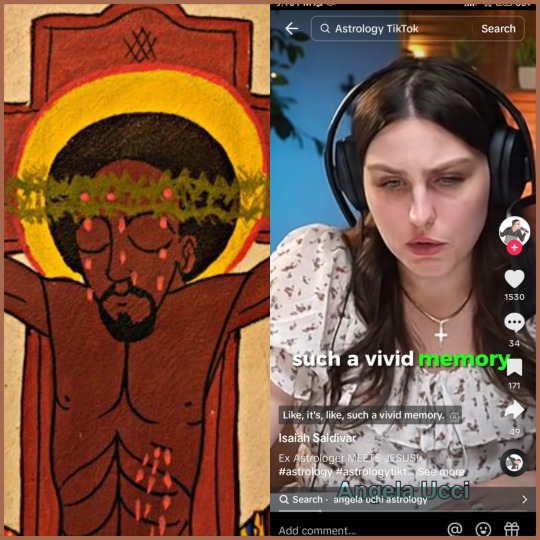
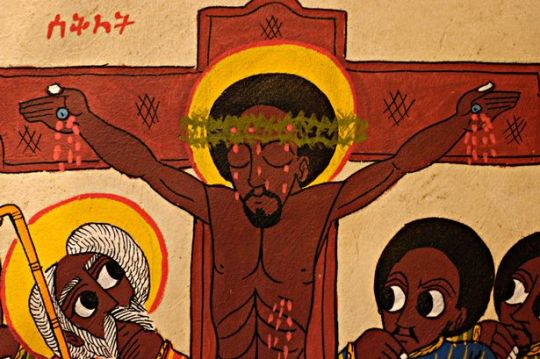
It's a photo of Jesus in the oldest Ethiopian bible. Well first Jesus came from a Jewish sect that used to study astrology and implement it into their lives. This Jewish sect is known as the Essenes. They lived in many places but frequently occupied the Judean desert or the dead sea. Hence why mainly the dead sea scrolls talked about them.


It was a part of their routines to study the cycles of the moon. My own personal beliefs are that they knew what the ascendant or rising sign was. Acts chapter 2 kinda referred to this daily routine. Pay attention to the nine o clock statements.

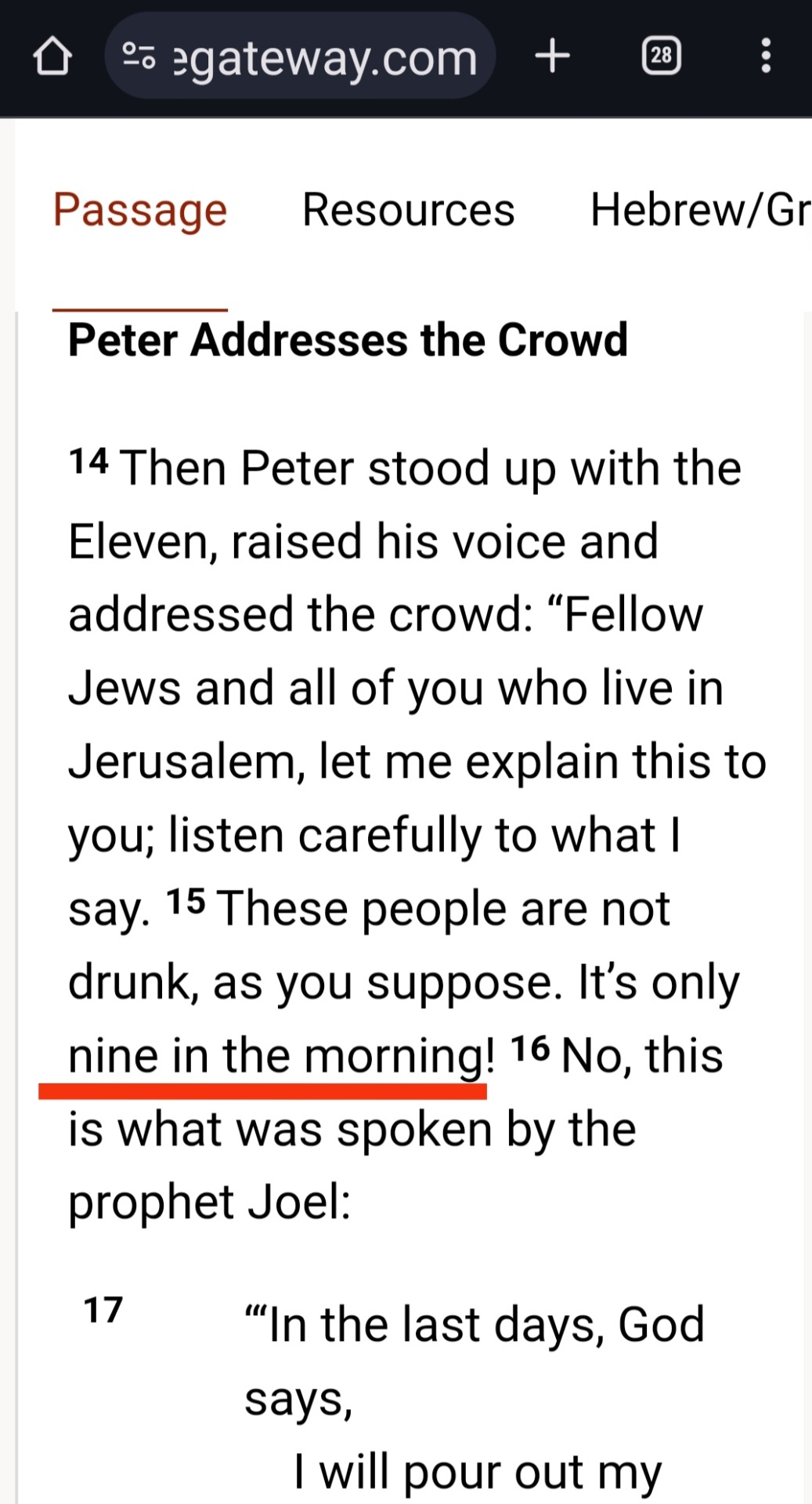
Compare what historian Josephus had said about the Essenes and that act verse.

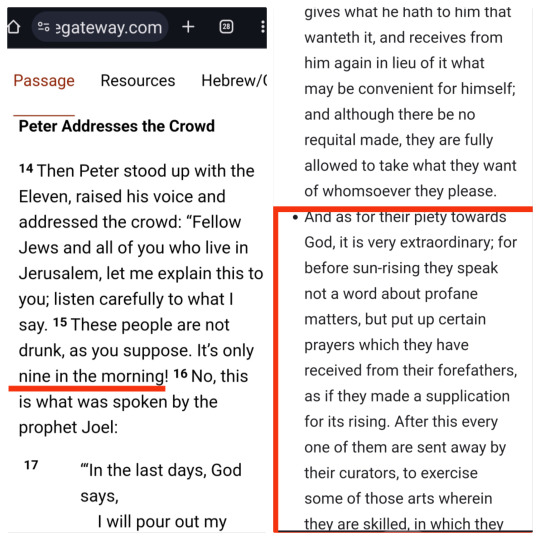
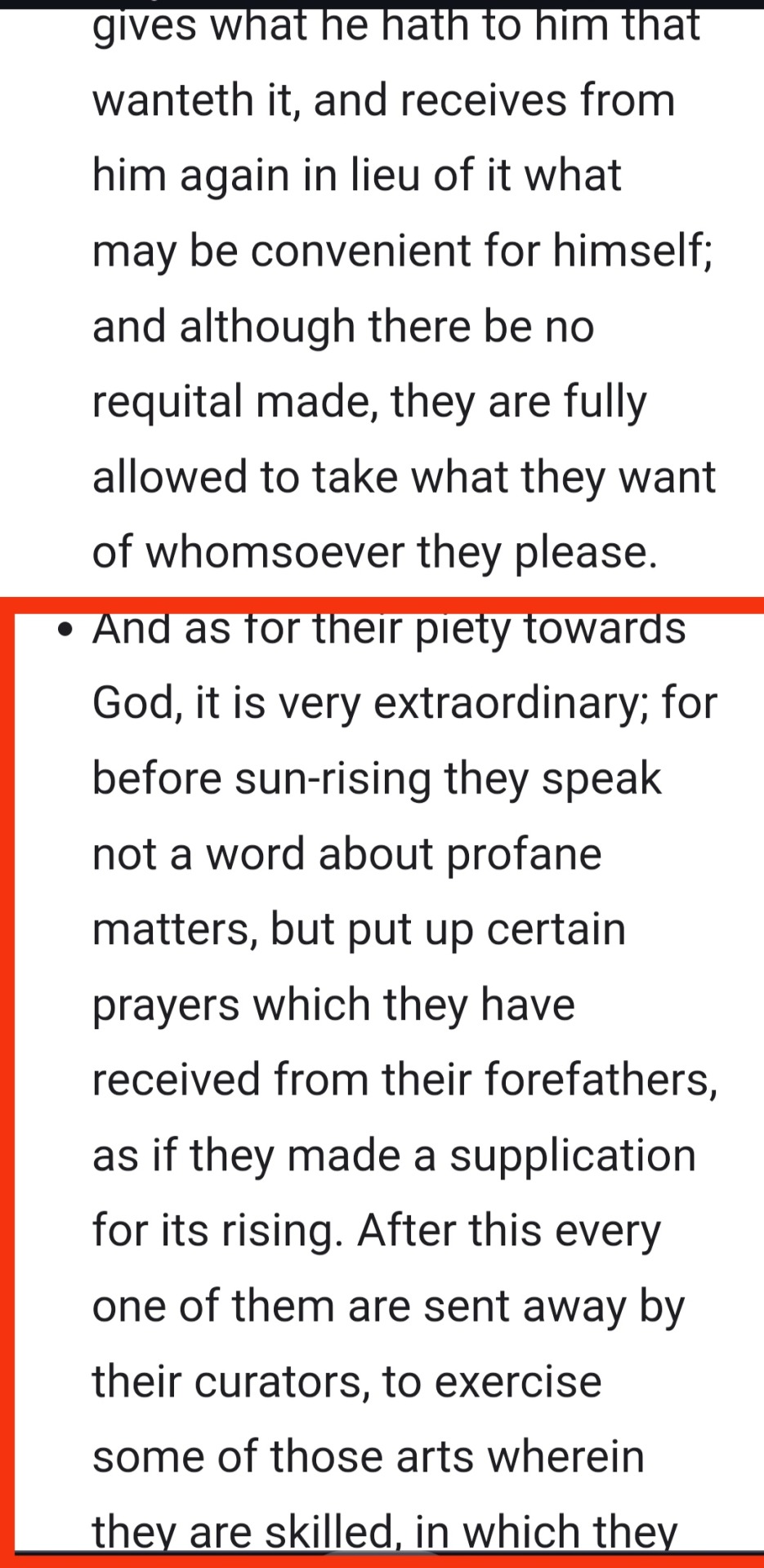
9 o'clock is important. I can't remember how it goes but I think the ascendant or rising sun is most visible at that time. Anyone into astrology already knows the ascendant or the 1st house deals with body structure, skin color etc. Well the Essenes knew this too so they would determine things like if someone will grow up to have a "patchy beard."They had a serious infatuation with the moon in Taurus because they thought that would be a great time for money to flow greatly in Israel.

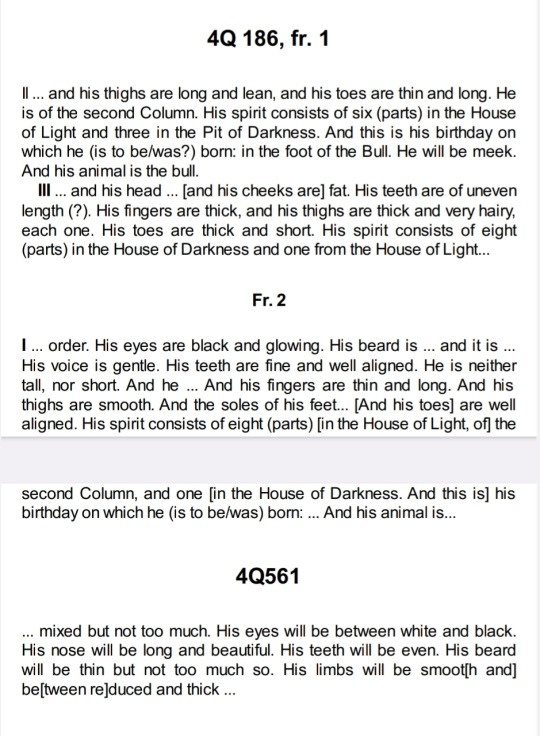
I could be wrong maybe it's them using the sun sign like how many use it today. For example I made a video on this but if you look at someone that has a sidereal sun Taurus. You would notice their face or head shape looks very similar to that of a bull. On the flip side the Essenes used terms like the "foot of the bull."
What comes to my mind when I hear that are constellations and nakshatras but who truly knows.
The Essenes had their own calendar and holidays even that was separate amongst the common Israeli. Jesus was actually the leader of this communist like Jewish sect called the Essenes. Jesus position was a guardian or a master. Which meant that he had full control over an organization that studied astrology. The guardian used to train new members of the Essenes (disciples.) This means Jesus taught astrology as well.
As you can imagine this organization is very similar to Freemasonry.

Since it was mainly guys and barely any women were a part of this Jewish sect.Of course the new testament diminishes this Jewish sect a lot. Seemingly because apostle Paul took over and wanted to change the narrative.
Paul even dissed vegans and called them weak. The Essenes were strict vegans.

Nope the pharisees didn't question Jesus because he ate meat. They questioned why he didn't follow the tradition of washing hands for a meal. Jesus's interpretation was that if the food is clean then his dirty hands won't make the food a person eats unclean. Jesus was questioned by the pharisees because he wasn't a part of that sect. Definitely he wasn't a Sadducee because the Essenes were poor. Historians like Josephus mentioned Jesus's disciples like John the Baptist being an Essene.

You may have read about Jesus protesting in a temple. The Essenes were against sacrificing animals. You know what they did in the temples? They sacrificed animals. Jesus may have came across as a vigilante. It's because supposedly one of his proteges


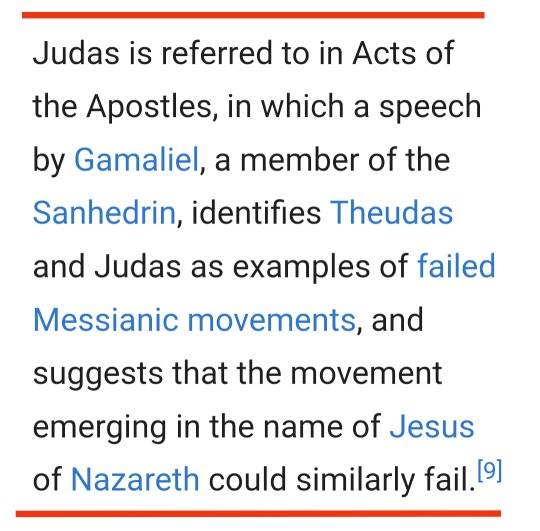
Was the owner of a protesting Jewish sect called the zealots. Although I can't confirm if that's the Judas discussed in the bible or if Jesus was affiliated with that organization. It's worth noting though because the Essenes were supposed to be docile but their master Jesus seemed very forceful at times.
Follow me on the other apps I'm out.
http://linktr.ee/astrologycharts
#astrology#vedic astrology#western astrology#astrology observations#astro observations#astrology community#astrology notes#Christianity#jesus#TheEssenes
17 notes
·
View notes
Text
November is the spooky month
BLOG: All Saints and All Souls
Halloween is past, with all its vampires, witches, werewolves, and classic movies starring Vincent Price or Christopher Lee. (It was 80F here, albeit with low humidity.) Yesterday shone with the brightness of the saints in light: "O how glorious is the kingdom in which the saints rejoice with Christ!" (from the antiphon to the Magnificat at second Vespers of All Saints Day)
Today is All Souls Day, sometimes called the Commemoration of All Faithful Departed, and now, with all the saints and all the souls mentioned, now is when my spooky season begins.
Nowadays the "saints" of All Saints Day are understood as those who were extraordinary, notable Christians, such as the Apostles of the New Testament, the martyrs of the first two or three centuries, the outstanding monastics and mendicants like St. Benedict, St. Francis, St. Teresa of Avila. There are many others who are honored who may or may not have been officially canonized by Roman Catholic authority but have become important to many Christians, like Hildegard of Bingen, Julian of Norwich, or Dorothy Day. That leaves All Souls' Day as a time to pray for the eternal welfare of all the ordinary, unknown Christians who didn't do anything heroic, like your parents (if they were baptized) or that devout old lady who used to babysit you.
However, I read something years ago, asserted by an Episcopalian priest and monk, that has stuck with me ever since. He said that originally, "all the saints" meant all baptized Christians, living and departed, heroic or average, virtuous or sinful. In the letters of the New Testament, Peter and Paul refer to what we could call the Church, capital C, as the saints. Anyone who has confessed faith in Jesus and been baptized in the Trinity is a saint, sanctified, made holy, destined for heaven.
The souls, according to this priest, for whom we pray on the day following All Saints meant everybody else: everyone who had died outside the Church, whether members of another religion, or Christians who had turned bad and died at odds with God. In this theology, anyone who hadn't confessed Jesus and been baptized was destined for hell, but the Church took one day to pray explicitly for their salvation, for a second chance that they might or might not get.
Do I believe that anyone who isn't a Christian will have some kind of punishment after death? No, I don't. But this older theology does explain the fear and trembling of the old Requiem Mass texts, the fear that even a Christian soul might fall into the pains of hell, the bottomless pit, the lion's mouth, Tartarus, the eternal darkness, without the guidance of the archangel Michael, the standard-bearer, and the prayers of the faithful still on earth.
What I do believe, as an Episcopalian but also a polytheist, is that anyone who has devotion and faith in a deity will be received by that deity after death, unless they have so deeply offended that deity's values as to make it impossible. To use a standard sort of example, I would assume that Joseph Stalin was baptized into the Orthodox Church as an infant, but having rejected all religion and carried out many atrocities in pursuit of his own power and security, he wouldn't want to be with Jesus even if Jesus invited him. I believe that Jesus is willing to receive anyone who turns to him, at whatever point in their life or afterlife.
However, not everyone has a devotion to a deity, or follows a school of spiritual practice. Not everyone even gets a formal burial. The Tibetan Buddhist Book of the Dead assumes that death is confusing, disorienting, and frightening; it attempts to offer direction to the dying or dead person, if not to enlightenment, then to a rebirth with a chance at enlightenment. I think that if a person isn't spiritually aware to a certain extent, their experience of death might not be heaven or hell, purgatory or reincarnation, but a sort of dull, shadowy half-life, as implied by the Hebrew Sheol, most of the Greek underworld, and the realm of Hel in Norse mythology--a place with neither punishment nor joy, no torment, no fulfillment, no meaning.
It is of those souls I think on All Souls' Day and through the month of November as the temperatures drop (though not as far as they used to), as the winds start to whine and howl around the corners of my building, as the texts of the liturgy increasingly look forward to Advent, to the promise of the Second Coming and the remaking of all things. It is for them I have lit a candle and put out a glass of pure water, not exactly an Anglican custom but not in opposition to the prayers of the Church. A little water for refreshment, a little light in the darkness. Follow the sound of voices singing, "O quam gloriosum est...." There is a way home through the dark for all of us.
2 notes
·
View notes
Text
Who is Jesus Christ?
1. The Son of God
Many Christians who understand their faith believe that Jesus Christ is the Son of God. The Holy Scriptures refer to Jesus as the Son of God several times. Let’s start from the conception of Jesus Christ.
Luke 1:30-35 (TLB) “Don’t be frightened, Mary,” the angel told her, “for God has decided to wonderfully bless you! Very soon now, you will become pregnant and have a baby boy, and you are to name him ‘Jesus.’ He shall be very great and shall be called the Son of God. And the Lord God shall give him the throne of his ancestor David. And he shall reign over Israel forever; his Kingdom shall never end!”Mary asked the angel, “But how can I have a baby? I am a virgin.”The angel replied, “The Holy Spirit shall come upon you, and the power of God shall overshadow you; so the baby born to you will be utterly holy—the Son of God.
This is a famous story told every Christmas when we celebrate the birth of Jesus, but there’s a chance you haven’t heard of it yet. It’s not a mere story; it is History. Mary, a young virgin in Nazareth, Galilee, was engaged to a descendant of the Jewish King David, Joseph. One day, God sent Gabriel – the Angel, to deliver a message to Mary. This is the message seen in the scripture above. God had chosen Mary to bear Jesus Christ. You might ask how? Mary asked the same question! The angel revealed to Mary that she would conceive of Jesus Christ through the Holy Spirit. This is the only event of its kind recorded in history. Jesus Christ was born as the angel of God said, and He has changed the world to date.
Before Jesus Christ started His ministry, His cousin, John the Baptist, had been announcing the coming of Christ.
John 1:23-28 (TLB) He replied, “I am a voice from the barren wilderness, shouting as Isaiah prophesied, ‘Get ready for the coming of the Lord!’”Then those who were sent by the Pharisees asked him, “If you aren’t the Messiah or Elijah or the Prophet, what right do you have to baptize?”John told them, “I merely baptize with water, but right here in the crowd is someone you have never met, who will soon begin his ministry among you, and I am not even fit to be his slave.”This incident took place at Bethany, a village on the other side of the Jordan River where John was baptizing.
Although John the Baptist didn’t know who Christ was, he announced that Jesus was the Christ when He came to be baptised by John the Baptist.
John 1:29-34 (TLB) The next day John saw Jesus coming toward him and said, “Look! There is the Lamb of God who takes away the world’s sin! He is the one I was talking about when I said, ‘Soon a man far greater than I am is coming, who existed long before me!’ I didn’t know he was the one, but I am here baptizing with water in order to point him out to the nation of Israel.”Then John told about seeing the Holy Spirit in the form of a dove descending from heaven and resting upon Jesus.“I didn’t know he was the one,” John said again, “but at the time God sent me to baptize he told me, ‘When you see the Holy Spirit descending and resting upon someone—he is the one you are looking for. He is the one who baptizes with the Holy Spirit.’ I saw it happen to this man, and I therefore testify that he is the Son of God.”
Several accounts of people calling Jesus the Son of God because of the supernatural things He did.
Nathanael:
John 1:49 (TLB) Nathanael replied, “Sir, you are the Son of God—the King of Israel!”
Peter:
John 6:68-69 (TLB) Simon Peter replied, “Master, to whom shall we go? You alone have the words that give eternal life, and we believe them and know you are the holy Son of God.”
Martha:
John 11:27 (TLB) “Yes, Master,” she told him. “I believe you are the Messiah, the Son of God, the one we have so long awaited.”
Paul the Apostle:
Romans 1:1-4 (TLB) Paul, Jesus Christ’s slave, chosen to be a missionary, and sent out to preach God’s Good News. This Good News was promised long ago by God’s prophets in the Old Testament. It is the Good News about his Son, Jesus Christ our Lord, who came as a human baby, born into King David’s royal family line; and by being raised from the dead he was proved to be the mighty Son of God, with the holy nature of God himself. Hebrews 4:14 (TLB) But Jesus the Son of God is our great High Priest who has gone to heaven itself to help us; therefore, let us never stop trusting him.
#christian broadcasting network#bible#bible verse#christianity#jesus#who is jesus#jesus christ#faith in jesus#faith#jesus loves you#jesussaves
4 notes
·
View notes
Text
A Short TedTalk
Ok so I was looking at the Prince Of Egypt tag on here and a lot of people were talking about how it's a Jewish film and story and we shouldn't be bringing Jesus/Christianity into it and in doing so, it's Jewish erasure. But here's the thing. The story of Moses that is found in the original Torah is part of Christianity as well. Now if you want to know how that is, you must understand some stuff. Many people tend to separate the Old Testament and the New Testament, saying one is for the Jews, the other for Christians. In reality, the entire Bible is for Christianity. It was given to us by God.
To associate only part of the Bible with our religion is like reading only part of a letter. You miss important information that relates to the part you read. In the same way, the Bible (which is like a letter from God) needs to be read as a whole. I once heard a pastor describe it like as artwork in a museum. The Bible is not a bunch of random, unconnected pieces of art to be viewed separately. It's a mural that is connected and ultimately tells one story, the story of God's love for humanity and the price His Son paid to save us from eternal suffering.
SO the Old Testament isn't just random stories that we teach kids in Sunday school. It's all relevant to Christianity today. From the Levitical laws that give us context for things in the New Testament, to the Psalms and their beautiful praises of God, and even the prophets who reference the coming of the Messiah, it's all relevant.
If you still think that its not, you need to remember: Jesus was Jewish! He came from the line of Judah who was one of the 12 sons of Jacob. Jesus followed the Law of Moses and participated in Passover and Sukkot and Yom Kippur. It was only when He sacrificed Himself, died on the cross in place of us, and rose again that Christianity began. Judaism was the main religion of most of the New Testament figures. They grew up just as Jesus and thousands of others did over the course of hundreds of years!
Now that we know that Jesus Himself was Jewish and that Him and His Father's story starts at the beginning of time, you can understand why many Christians classify the Prince Of Egypt as a "Christian" movie. Its because it is a fantastic testimony to the wonder and power of our God. And by doing so, we are not removing the Jewish aspects of the film. Rather, we're celebrating and remembering the rich culture and history that our Savior grew up in. Thanks for coming to my TedTalk.
#i needed to get this out of my system#ta-da#prince of egypt#christianity#judaism#God#Jesus#the Bible
6 notes
·
View notes
Note
Anon worried about her trans-identified friend again, I wish I had the words to express how much I appreciate your kind words!!! (Maybe admitting it made me tear up would help? haha) Your response was just as thoughtful and considerate as I thought it would be, but I never expected you'd write so much for a stranger talking about another stranger, let alone throw compliments my way. You're a truly special person and everyone on here, including me, is so lucky we get to hear what you have to say and chat with you :) (And see your wonderful art to boot!! Finding another bug-lover is such a lovely surprise!)
I'll keep your kind thoughts in mind whenever the rare friction comes up again between my friend and me. It was such a quick process for me to desist and become gender critical that I think it's easy for me to forget how much harder it is for people to change their minds on the trans topic when they're so much more invested in it than I was. (Feel the same way about religion too, even as a little kid I was asking questions about why certain things bothered me in the Bible and getting frustrated when I got shame instead of answers. Maybe being annoying and asking too many questions is just in my DNA haha. But all the more reason why it's important to help those who aren't naturally critical: they're the ones falling for unreality the hardest because of that fact.)
Ultimately I will keep being me and see what happens, like I've done before. If nothing comes of it, then there was nothing else I could've done differently anyway. I've asked her if she'd like to do gift exchange for the holidays. We're planning on getting each other a few embarrassingly nerdy collectibles we've been eyeing for a while :)
Thank you again for your help, I'll cherish your words always!!! Hope you have a blast on your trip and get to see all the little guys you could dream of!!!
I'm very glad to hear from you, anon! :) and thank you so much for the kind words! it makes me very happy to be able to help in any way. ❤️
It's funny that you mention questioning the bible as a kid. I went to catholic school and I remember being taught in first grade that we were supposed to love god more than anything. More than we loved our parents or even our dogs, and I just couldn't get past the notion that I had to somehow love the kinda mean, angry, invisible flying grandpa*, who never says a damn thing when I pray, over the actual people who had raised me. I stayed in catholic school until graduation despite opposing catholicism, argued a LOT. I think my point is that I've also kind of been primed for voicing unpopular opinions, so I'm biased when it comes to people who are more hesitant to take any position on the matters at hand.
*sidenote, around this time I obsessively read My Book of Bible Stories (1978) which was given to me by JW doorknockers. This is a bit uncanny, I haven't seen this since I was about 8. It was a treasured book to me, it's full of old testament stories and pretty brutal:
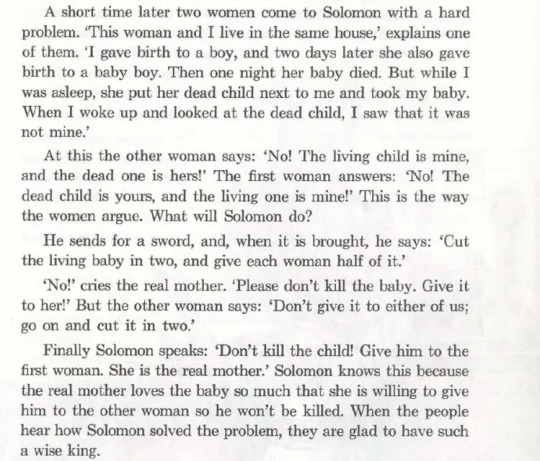
To demonstrate how young I was while reading this: the book refers to god as Jehovah, but I was still learning to read and thought he was called Joseph. So all the adults I told all these Joseph stories to were confused as to why I thought Jesus's stepdad was so OP. Anyway yes, Joseph was a scary guy in my mind, I mean look what he made abraham do before he said sike:
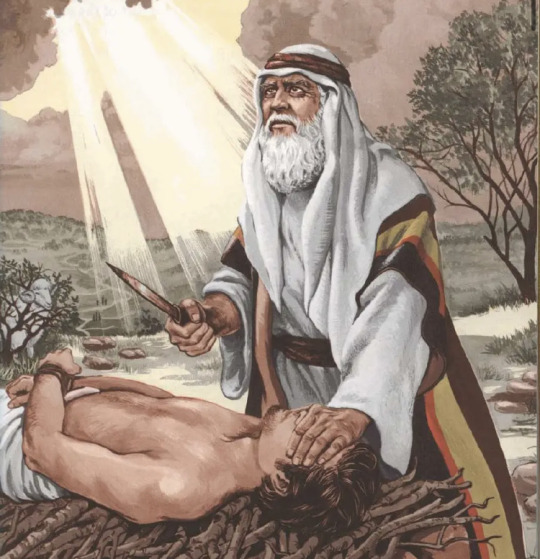
which really didn't give me much faith in him. Kind of a questionable thing to do to a guy tbh. Finally here's the illustration that basically inspired my URL:
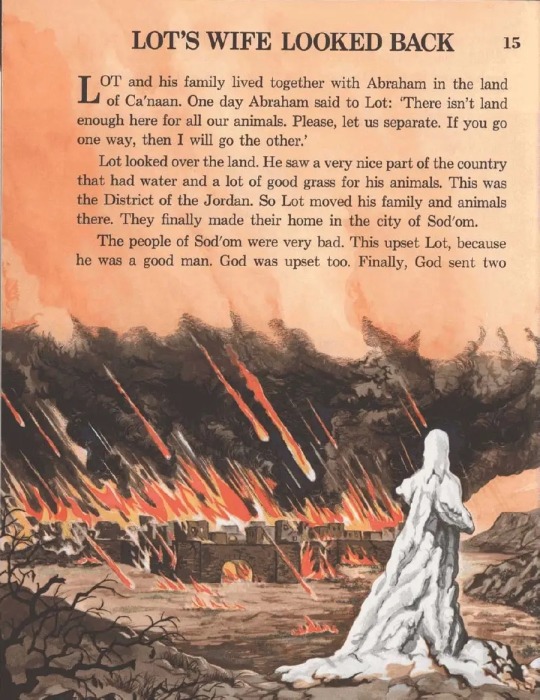
Sorry to hijack your ask anon, for some reason your message sent me down memory lane. Finding that pdf was crazy.
ANYWAY: you made my night with yoir nice message, so thanks for that, hope you stay well. I'm happy that it's chill for the time being, and the gift exchange sounds like fun. Come around to chat anytime.✌️
5 notes
·
View notes
Text

The Angel of the Lord
The identity of the 'angel of the Lord' is a captivating mystery in the Bible. This enigmatic figure appears in many important stories in the Old and New Testaments, often displaying divine attributes that go beyond those of a typical angel.
In the Old Testament, the 'angel of the Lord' is not just a messenger but also carries divine authority and power. For example, in Genesis 16:7-12, this angel meets Hagar in the wilderness, offering comfort with a voice that reflects God's omnipotence. Another notable example is in Genesis 22:11-18, where the angel stops Abraham from sacrificing Isaac and speaks as the voice of God.
These stories suggest that the 'angel of the Lord' may be more than an angel and could possibly be a visible manifestation of God, known as a theophany. This is seen in encounters like the one with Samson's parents in Judges 13:3-22, where they feared they had seen God face to face. This concept of the 'angel of the Lord' being a manifestation of God raises interesting theological questions about how God interacted with people in the Old Testament and how directly humans could encounter God.
As we move from the Old Testament to the New, there is a significant change in references to this angelic figure. The 'angel of the Lord' appears less frequently, especially after the birth of Jesus. When the angel appears to Joseph in Matthew 1:20-24, it takes on a more traditional angelic role. This shift emphasizes the New Testament's profound focus on Jesus Christ as the complete revelation of God (Hebrews 1:1-3).
The decreasing appearances of the 'angel of the Lord' after Jesus's birth indicate a significant change. It suggests that Christ has taken on this role, directly intervening in the world. This is reinforced by Jesus's own words in John 8:58, which affirm His eternal presence and role in human history. This transition from the 'angel of the Lord' to Jesus Christ marks a progression in God's revelation, with Jesus being the ultimate revelation to humanity.
These divine interactions, whether seen as theophanies or Christophanies, are a constant reminder of God's unwavering involvement and commitment to guiding and protecting His people. They offer us a glimpse into the multifaceted nature of God's revelation. Let us strive to understand and cherish the profound mysteries of our faith as they are unveiled through Scripture.
P.S. Please look at the links below for a detailed discussion of the blog post.
Detailed Blog Post
#faithfulreflections#christian blog#jesus christ#the angel of the lord#christian faith#angel#theophanies#Christophanies#scripture
3 notes
·
View notes
Text

“A woman from Samaria came to draw water. Jesus said to her, “Give me a drink.” (For his disciples had gone away into the city to buy food.) The Samaritan woman said to him, “How is it that you, a Jew, ask for a drink from me, a woman of Samaria?” (For Jews have no dealings with Samaritans.) Jesus answered her, “If you knew the gift of God, and who it is that is saying to you, ‘Give me a drink,’ you would have asked him, and he would have given you living water.” The woman said to him, “Sir, you have nothing to draw water with, and the well is deep. Where do you get that living water? Are you greater than our father Jacob? He gave us the well and drank from it himself, as did his sons and his livestock.”
Jesus said to her, “Everyone who drinks of this water will be thirsty again, but whoever drinks of the water that I will give him will never be thirsty again. The water that I will give him will become in him a spring of water welling up to eternal life.” The woman said to him, “Sir, give me this water, so that I will not be thirsty or have to come here to draw water.” —John 4:7-15 (ESV)
“The Living Water” By Rev. Sergei Sosedkin:
“In our passage for today Jesus talks with a woman in Samaria about water. He discusses drinkable and living water. Fresh drinking water is a precious resource. Everyone needs it to survive. But Jesus says that the water he gives brings life. He provides living water that wells up within us to eternal life!
Many Old Testament passages speak of thirsting after God as being famished on a hot day and needing a cool drink. God is called the fountain of life and the spring of living water. In our reading today, living water refers to eternal life. Once we satisfy our spiritual thirst with living water, we will never thirst that way again. The Lord provides this living water in our souls so that we can draw upon it continuously.
If we feel lost in a spiritual desert, only Jesus can show us the way out. Only he can quench our thirst for God and give us the gift that satisfies the deepest desire of our souls.
Lord, thank you for spiritually refreshing our souls with living water through Jesus and by your Spirit. Help us to share this wonderful gift with all the thirsty people we meet. Amen.”
#john 4:7-15#bible#christian blog#god#belief in god#faith in god#jesus#belief in jesus#faith in jesus#bible verses#bible truths#bible scriptures#bible quotes#bible study#christian devotionals#christian encouragement#christian life#christian faith#christian inspirational quotes#christian inspiration#christian living#christianity#christian motivation#christian quotes#living water#encouragement#rev. sergei sosedkin#keep the faith#make him known
27 notes
·
View notes